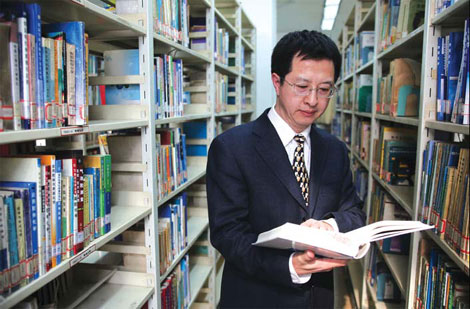
Persistence is needed to raise the profile of translated books
Chinese translators, college teachers, and writers are making concerted efforts to build bridges in order to give Chinese literature a stronger presence in the West.
 Zhang Jian, dean of the School of Chinese language and literature of Beijing Normal University, said the school is working with the University of Oklahoma to translate and publish 10 volumes of Chinese literary works into English.
Wang Jing / China Daily |
In January, The Chinese Literature for Overseas Communication Project was officially launched at Beijing Normal University (BNU). In partnership with the University of Oklahoma (OU) in the United States, the project aims to translate and publish ten volumes of literary works into English. The works will be published by the Oklahoma University Press and made available to the public within the next three years.
The project also plans to publish an English academic journal, Chinese Literature Today, in the US, focusing on modern Chinese writers, their works and literary criticism.
"Promoting Chinese literature overseas is not a one-sided effort. We must also pay attention to the interests of foreign readers, and that is why we are cooperating with our US counterpart," Zhang Jian, dean of BNU's School of Chinese language and literature, informed the media.
Tsinghua University is also keen to make Chinese writing available in English. The university plans to translate and publish six volumes of Chinese contemporary writers' classics within five years. Divided into volumes for novels, short stories, poems, dramas, essays, and criticism, the project will feature such acclaimed Chinese writers as: Lu Xun, Mao Dun, Ba Jin, Lao She, Wang Meng, Bian Zhilin, Wang Anyi, Mo Yan, and Yu Hua. The aim is to provide a panoramic view of Chinese 20th century literature.
The Chinese Writers' Association (CWA) is also continuing to push its translation project this year. The project was launched at the end of 2006 with the intention of publishing translations of one hundred Chinese contemporary novels within five years. The works, most of which were written after the Cultural Revolution, will also be translated into other languages besides English, for countries such as Russia, Poland and Cuba.
However, Tie Ning, chairwoman of CWA who is also a well-known Chinese writer, said the number of foreign books introduced to China still far outweighs the number of Chinese works introduced to the west, and that this situation won't change in the short term.
"Cultural exchanges are different from economic exchanges. It is a comparatively slow process, which requires us to have more patience and persistence," she told Guangming Daily in her most recent interview.
Good translations are essential in order for Chinese literature to be accepted by foreign readers in the future. Howard Goldblatt, a leading translator of Chinese literature said, some languages resist good translation, because the right words are simply unavailable or inefficient at conveying the meaning and style. One of Goldblatt's recent translations is the novel Wolf Totem, a 2004 best-seller written by Chinese author Jiang Rong,
"The word ketou (literally, to knock one's head loudly on the floor). While 'kowtow' is one of those rare Chinese words that has made it into the English lexicon, Western readers cannot know the range of contexts, nuances and tones that give it its evocative power in Chinese," he wrote in his article Writing Life published by Washington Post.
In a talk with the Shanghai-based Wen Hui Daily last November, Jia Pingwa, a Chinese writer whose works have been translated for many countries, said the biggest problem for Chinese literature is that some of the language cannot be translated. "Like my work Qin Qiangthe book does not tell a story, but talks instead about the local languages. It will be very hard to translate to other languages while still maintaining its flavor," he said.
But according to Goldblatt, sometimes a translation can enhance a work in ways the author never imagined. A good translation can make the story and context readable and accessible to readers from other countries.
"Gabriel Garca Marquez has said he prefers Gregory Rabassa's English translation of One Hundred Years of Solitude to the Spanish original, to which Rabassa replied, 'That is probably less of a compliment to my translation than it is to the English language.'" Goldblatt noted.
Although there is a long way to go, Tie Ning is quite optimistic about the future of Chinese literature in foreign markets.
"Literature, is a very important segment of culture, which will continue to play an very important role in enhancing the mutual understanding between the world and us," she said.